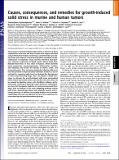Causes, consequences, and remedies for growth-induced solid stress in murine and human tumors
Author(s)
Martin, John Daniel; Jain, Saloni R.; Stylianopoulosa, Triantafyllos; Chauhana, Vikash P.; Bardeesy, Nabeel; Diop-Frimpong, Benjamin; Stylianopoulos, Triantafyllos; Smith, Barbara L.; Ferrone, Cristina R.; Hornicek, Francis J.; Boucher, Yves; Munn, Lance L.; Jain, Rakesh K.; ... Show more Show less
DownloadStylianopoloulos-2012-Causes, consequences, and remedies for.pdf (2.057Mb)
PUBLISHER_POLICY
Publisher Policy
Article is made available in accordance with the publisher's policy and may be subject to US copyright law. Please refer to the publisher's site for terms of use.
Terms of use
Metadata
Show full item recordAbstract
The presence of growth-induced solid stresses in tumors has been suspected for some time, but these stresses were largely estimated using mathematical models. Solid stresses can deform the surrounding tissues and compress intratumoral lymphatic and blood vessels. Compression of lymphatic vessels elevates interstitial fluid pressure, whereas compression of blood vessels reduces blood flow. Reduced blood flow, in turn, leads to hypoxia, which promotes tumor progression, immunosuppression, inflammation, invasion, and metastasis and lowers the efficacy of chemo-, radio-, and immunotherapies. Thus, strategies designed to alleviate solid stress have the potential to improve cancer treatment. However, a lack of methods for measuring solid stress has hindered the development of solid stress-alleviating drugs. Here, we present a simple technique to estimate the growth-induced solid stress accumulated within animal and human tumors, and we show that this stress can be reduced by depleting cancer cells, fibroblasts, collagen, and/or hyaluronan, resulting in improved tumor perfusion. Furthermore, we show that therapeutic depletion of carcinoma-associated fibroblasts with an inhibitor of the sonic hedgehog pathway reduces solid stress, decompresses blood and lymphatic vessels, and increases perfusion. In addition to providing insights into the mechanopathology of tumors, our approach can serve as a rapid screen for stress-reducing and perfusion-enhancing drugs.
Date issued
2012-08Department
Harvard University--MIT Division of Health Sciences and Technology; Massachusetts Institute of Technology. Department of Chemical EngineeringJournal
Proceedings of the National Academy of Sciences of the United States of America
Publisher
National Academy of Sciences (U.S.)
Citation
Stylianopoulos, T. et al. “Inaugural Article: Causes, Consequences, and Remedies for Growth-induced Solid Stress in Murine and Human Tumors.” Proceedings of the National Academy of Sciences 109.38 (2012): 15101–15108. ©2012 National Academy of Sciences
Version: Final published version
ISSN
0027-8424
1091-6490